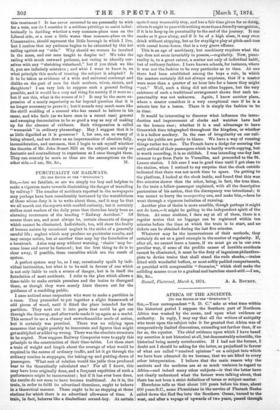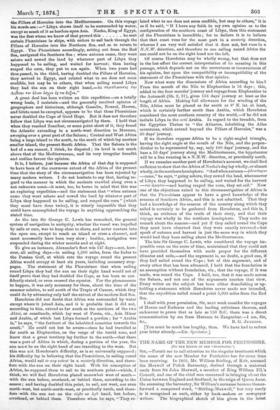AFRICA OF THE ANCIENTS.
(TO THU EDITOR OP THIS "SPROTA.T011.)
SIR,—Your correspondent "S. D. C." asks at what time within- the historical period I suppose the Southern part of Northern Africa was washed by the ocean, and upon what evidence or authority. In reply, I may say that all the writers of antiquity who treat upon the subject take it for granted that Africa was of comparatively limited dimensions, extending not farther than, if so- far as, the equator. The chief evidence upon which I have based my assertion is not historical at all, but demonstrably scientific, the historical being merely corroborative. If I had not the former, I doubt not I should be asking for the latter, so prejudiced in favour- of what are called "received opinions" on a subject into which we have been educated do we become, that we are blind to every other interpretation. I believe that the main reason why the ancients and the moderns are at so much variance in regard to. Africa—and indeed many other subjects—is that the latter have- not clearly understood what the former were talking about, that there has not been a strict definition of terms or subject-matter.
Herodotus tells us that about 150 years before his time, about 600 years B.C., some Phcenicians in the service of Pharaoh Necho- sailed down the Red Sea into the Southern Ocean, turned to ther west, and after a voyage of upwards of two years, passed through
was the first whom we know of that proved this
he sent of the Phoeniciana is incredible ; for to believe it is to believe certain Phoenicians in ships, with orders to sail back through the that that coast runs for the most part in a westerly direction, Pillara of Hercules into the Northern Sea, and 80 to return to whereas I am very well satisfied that it does not, but runs in a Egypt. The Phosnicians accordingly, setting out from the Red N.N.W. direction, and therefore to one sailing round Africa the Sea, navigated the Southern Sea ; when autumn came, they went sun could not be on the right hand nor the left.
ashore and sowed the land by whatever part of Libya they Of course Herodotus may be wholly wrong, but that does not happened to be sailing, and waited for harvest; then having in the lestsffect the correct interpretation of his meaning in this reaped the corn, they put to sea again. When two years had passage, which depends not on the correctness or incorrectness of thus passed, in the third, having doubled the Pillars of Hercules, his opinion, but upon the compatibility or incompatibility of the they arrived in Egypt, and related what to me does not seem statement of the Phcenicians with that opinion. credible, but may be to others, that when sailing round Libya Now what were the dimensions of Africa according to him? they had the sun on their right hand,—es; IrEpscr?.csorrsc rsy From the mouth of the Nile to Elephantine is 16 days ; this,
At8usv rot+ ;Poo ioxoti i5 ra beta." added to the four months' journey and voyage from Elephantine to A great deal has been written on this expedition—on a totally the Automoli (lib. 2, 31), gives 136 days' journey at least as the wrong basis, I maintain—and the generally received opinion of length of Africa. Making full allowance for the winding of the geographers and historians, although Gosselin, Rennel, Heeren, Nile, Africa must be placed as far south as 8° N. lat. at least, and Grote must be excepted, appears to be that these Phcenicians which is certainly farther south than Arabia, which Herodotus never doubled the Cape of Good Hope. But it does not therefore considered the most southern country of the world,—if he did not follow that Libya was not circumnavigated by them. I hold that include Libya in the acte Arabia. In regard to the breadth, from when they reached Zanzibar, or some point short of it, they found the Egyptian Thebes to " the Atlantes, inhabiting the Atlas the Atlantic extending in a north-west direction to Marocco, mountains, which extend beyond the Pillars of Hercules," was a sweeping over a great part of the Sahara ; Central and West Africa 50 days' journey.
being a large island to the south, to the south of which lay another E we therefore suppose Africa to be a right-angled triangle, smaller island, the present South Africa. That the Sahara is the having the right angle at the mouth of the Nile, and the perpen- bed of a sea cannot, I think, be disputed ; its level is not much dicular to be represented by, say, only 100 days' journey, and the above that of the Mediterranean, and its very irregular breadth base a 50 days' journey along the Mediterianean, the hypotenuse and outline favour the opinion. will be a line running in a N.N.W. direction, or practically north.
to have been of the enormous extent of the Africa of the present sufficient to show that the Africa of N echo's day, lay wholly, or almost time that the story of the circumnavigation has been rejected by wholly, in the northern hemisphere. "And when autumn—isdivocrespow many modern writers. I do not hesitate to say that, having re- —came," he says, " going ashore, they sowed the land, wheresoever gard to the manner in which the ancients crawled along even a of Libya they happened to be sailing, and waited for the harvest
not unknown coast—it must, too, be borne in mind that this was —row apsrov—and having reaped the corn, they set sail." Now an exploring expedition—and the statement that "when autumn one of the objections raised to this circumnavigation of Africa is came they went ashore and sowed the land by whatever part of that the Phceniciana appear to have a good knowledge of the Libya they happened to be sailing, and reaped the corn" (which seasons of Southern Africa, and this is not admitted. That they -they must have done twice), it is utterly impossible that they had a knowledge of the seasons of the country along which they could have accomplished the voyage in anything approaching the sailed is certainly to be gathered from Herodotus, and this is, I
stated time, think, an evidence of the truth of their story, and that their As the late Sir George C. Lewis has remarked, the general voyage was wholly in the northern hemisphere. They make no system of navigation in antiquity, whether the vessel was impelled remark about the seasons—and yet if they sailed round the Cape by sails or oars, was to keep close to shore, and never venture into they must have observed that they were exactly reversed—but the open sea, except to reach an island or cross a channel, and speak of autumn and harvest in just the same way in which they must necessarily have been very slow ; besides, navigation was would had they been sailing about the Mediterranean. suspended during the winter months and at night. The late Sir George C. Lewis, who considered the voyage im- To give an instance, Alexander's fleet ws 147 days—not, how possible even on the score of time, maintained that they could not ever, all sailing days—in sailing 1,500 miles, from the Indus to have provided themselves with seeds proper for the different the Persian Gulf, at which rate the voyage round the present climates and soils,—and the argument is, no doubt, a good one, if Africa would occupy at least six years, including necessary stop- they had sailed round the Cape ; but of this argument, and of pages. The statement of the Phcenicians that when sailing every other that has been advanced, I hold that the foundation is ound Libya they had the sun on their right hand would not of an assumption without foundation, viz., that the voyage, if it was itseif prove that they had doubled the Cape, as has been so con made, was round the Cape. I hold, too, that it was made across fidently stated, or even crossed the equator. For the phenomenon the Sahara, and not one of the arguments touches that view. to happen, it was only necessary for them, about the time of the Every writer on the subject has been either demolishing or up- summer solstice, to sail south of the Tropic of Cancer, which they holding a statement which Herodotus never made nor intended, -could do by advancing only half the extent of the modern Red Sea. that the expedition sailed round a point 5,000 miles from the Red Herodotus did not doubt that Africa was surrounded by water Sea.
except where-it joined Asia, and it is probable that it did not, I shall with your permission, Sir, next week consider the voyages -according to him, extend so far south as the southern of the two of Hanno and Eudoxus and the leading criticisms thereon, and a direct Alclai, or coastlands, which lay west of Persia, viz., Asia Minor endeavour to prove that as late as 150 B.C. there was
and Arabia, of which last Libya formed a portion ; for "Arabia communication by sea from Maroon to Zanguebar.—I am, Sir, is," he says, "the farthest of the inhabited countries towards the 84Co B. G. JENKINS.
south." He could not but be aware—since he had travelled as [You must be much less lengthy, then. We have had to reduce far south as Elephantine, on the verge of the torrid zone, and your letter already.—En. Spectator.] knew that a great territory lay further to the south—that there
was a part of Africa in which, during a portion of the year, the THE NAME OF THE NEW MEMBER FOR PERTHSHIRE.
sun must be on the right hand of one travelling to the west. But [TO TIIK EDITOR OF TEM " SPECTATOR:1 this was not Herodotus's difficulty, as is so universally supposed ; SIR,—Permit me to call attention to the singular treatmentwhich his difficulty lay in believing that the Phcenicians, in sailing round the name of the new Member for Perthshire has for some time Africa, would sail to any extent in a westerly direction, and there- been receiving. In 1866, Mr. 1Villiam Stirling, of Keir, assumed fore with the sun on their right hand. With his conception of the Maxwell of Pollok Baronetcy, derived through a maternal Africa, he supposed them to sail to its southern point—which, I uncle from Sir John Maxwell, a member of King William M.'s think, we will find Herodotus placed somewhat west of south— Council, and one of the chief men concerned in bringing about the with the sun before, overhead, or behind them, according to the Union between England and Scotland, in the reign of Queen Anne. 'season; and having doubled this point, to sail, not west, nor even On assuming the baronetcy, Sir William's surname became thence- north-west, but north-north-west, or practically north, and there- forward a compound word, "Stirling-Maxwell," but very rarely fore with the sun not on the right or left hand, but before, is it recognised as such, either by book-makers or newspaper overhead, or behind them. Therefore when he says, "They re- writers. The biographical sketch of him given in the latest
and outline favour the opinion. will be a line running in a N.N.W. direction, or practically north. It is, I believe, just because the Africa of that day is supposed If we examine another part of Herodotus's account, we shall find , stated time, think, an evidence of the truth of their story, and that their



































 Previous page
Previous page